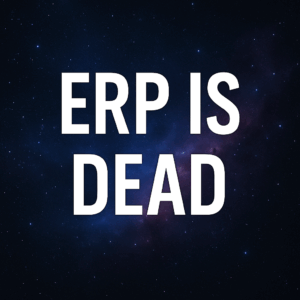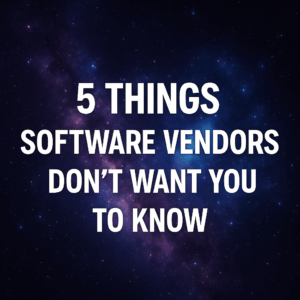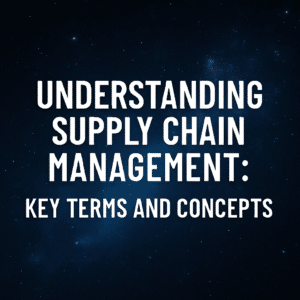ERP software may not be the appropriate solution for your organization’s digital transformation. However, it is important to explore alternative options and determine what the right answer might be. If you choose not to deploy an ERP system, there are various alternatives available.
![What Are the Alternatives to Traditional ERP Systems? [Death of ERP Software, Part II] 1 YouTube player](https://i.ytimg.com/vi/NTWK34u3pJE/maxresdefault.jpg)
It is important to maintain an open mind and explore alternative options available in the marketplace beyond ERP. These options are not mutually exclusive. It is possible to have an ERP system to handle certain aspects of your business while utilizing other types of technologies to address other areas. Today, I will discuss some of these options and alternatives that you may consider when defining the digital strategy for your organization.
Table of Contents
ToggleBest of Breed Solutions
One of the most viable and mature alternatives to traditional ERP systems are best-of-breed solutions. Best-of-breed solutions are niche solutions that focus on specific functionality or industries. For example, there are CRM systems that solely concentrate on Salesforce automation and customer relationship management. Vendors like Salesforce provide CRM capabilities. Additionally, there are HCM or HR technologies such as Workday, as well as business intelligence options (which I will discuss later in this video).
In the past, integrating multiple systems posed challenges in terms of complexity and risk. However, with modern integration tools, improved data integration, and a wider range of options, the best-of-breed approach has become more viable than ever.
While there are trade-offs and risks associated with best-of-breed solutions, such as increased integration efforts and potential data integration issues, there are also significant benefits. Now, you can find technologies that meet specific needs without attempting to cover all aspects or cater to everyone.
Furthermore, in some cases, best-of-breed solutions are less complex than a fully integrated ERP system. You can deploy these solutions as standalone options without dealing with the complexities of a single integrated enterprise-wide solution. While both options have their pros and cons, the best-of-breed approach is gaining popularity in the enterprise technology space. In fact, these best-of-breed alternatives are gradually eroding the market share of major ERP software providers.
![What Are the Alternatives to Traditional ERP Systems? [Death of ERP Software, Part II] 2 YouTube player](https://i.ytimg.com/vi/g3I3Tyg6DpE/maxresdefault.jpg)
Workflow and Interoperability
Another emerging tool set that is gaining popularity in the enterprise technology space is a type of software that focuses on workflows and interoperability. It is similar to best-of-breed solutions but can be considered as a version 2.0 of the concept.
These technologies enable you to enhance integrated workflows and data visibility across your existing systems. It may remind you of the concept of middleware from around 20 years ago, but with the addition of business intelligence, workflow, and analytics capabilities. This means you can integrate multiple systems, whether it’s a fully best-of-breed solution or by integrating legacy systems that are already in place.
These types of tools provide a less invasive way of deploying new technologies while leveraging the investments you have already made, without requiring a complete replacement of your enterprise-wide suite of solutions. Some popular examples of interoperability and workflow systems include products like Snowflake, which offers business intelligence and workflow analytics functionalities.
Another notable product is Palantir, which provides workflows, integration, and enhanced analytics across multiple systems. This concept of workflow and interoperability software represents another iteration or advancement in the evolution of best-of-breed solutions, offering an excellent alternative to single integrated ERP systems.
![What Are the Alternatives to Traditional ERP Systems? [Death of ERP Software, Part II] 3 YouTube player](https://i.ytimg.com/vi/K-JZH4oOJhI/maxresdefault.jpg)
Software Platforms
A significant trend in the digital transformation space is the deployment of software platforms instead of just software applications. Software platforms differ from applications as they focus on creating a foundation that can leverage multiple technologies.
To illustrate this, let’s take the example of Salesforce, which I mentioned earlier as a CRM solution. Salesforce not only offers CRM applications but also provides a platform for building third-party applications. Specifically, Salesforce has a platform called Force, which enables third-party developers to write code and create systems and applications that extend the functionalities of the core Salesforce product.
For instance, Rootstock is a software vendor that utilizes the Force platform to provide manufacturing ERP capabilities, leveraging Salesforce as the core foundation while catering to manufacturing-specific requirements.
The Force platform hosts numerous other applications that may be suitable for various business needs. It’s important to note that the Force platform is just one example, and there are other platforms available. Microsoft Dynamics, for instance, also follows a platform approach, allowing third-party developers to customize and tailor it for specific industries or functions based on the diverse needs of the global economy.
Organizations are increasingly shifting their focus in digital strategies from individual applications to building platforms that offer greater flexibility. This is particularly advantageous when organizations have competent and robust IT teams who can contribute to the creation of these third-party solutions.
Low Code/No Code Systems
One of the major drawbacks of ERP software is the complexity involved in implementing the solution. This complexity arises from the need to make decisions across integrated end-to-end business processes, which increases the complexity, time, risk, and cost associated with ERP implementation.
However, a new category of software solutions is emerging, focusing on low-code and no-code approaches. These systems do not require the intricate configuration or customization typically demanded by ERP systems. They can now be deployed in a manner that allows average end-users to configure and modify them with significantly less complexity and effort compared to a typical ERP system.
The rise of low-code and no-code solutions in the software space is gaining significant traction. Many organizations are turning to these solutions as a favorable alternative to the more complex, risky, and costly deployments associated with ERP software.
Artificial Intelligence
Finally, artificial intelligence (AI) is ushering in a new era of technology and extending the capabilities of digital transformations in unimaginable ways. AI enables organizations to leverage their existing data and technologies. If you’re like most organizations, you have accumulated vast amounts of data, transactional information, and master data over the years.
However, fully making sense of and utilizing this data may still be a challenge. While business intelligence and reporting tools help analyze transactional history and summarize past performance, AI takes it a step further by providing new insights and meaning that were previously inaccessible. The beauty of AI is that it allows you to maximize your data utilization without necessarily requiring the latest, most modern enterprise-wide ERP system.
AI is also pushing the boundaries and changing expectations of enterprise technology. With the introduction of chatbots and other generative AI tools at the consumer level, we are becoming accustomed to asking AI questions and receiving the desired information. Instead of memorizing which screen to navigate or which fields to fill in, we can interact with AI interfaces to gather information and insights.
For example, we can inquire about the number of open customer orders or the number of orders that are past the promised date. These are just a couple of examples of how AI can transform our interaction with enterprise technology. Additionally, AI offers an alternative to ERP systems and, at the very least, influences the future expectations and capabilities of ERP systems.
![What Are the Alternatives to Traditional ERP Systems? [Death of ERP Software, Part II] 4 YouTube player](https://i.ytimg.com/vi/P420d7Qc6-A/maxresdefault.jpg)
These are just a few considerations and technologies to ponder as part of your digital strategy, especially if you aim to go beyond traditional ERP software. While monolithic, fully-integrated ERP systems have their advantages and are suitable for specific scenarios, they may not fit every situation. There are numerous new technologies available that can either enhance traditional ERP software or entirely replace the need for it. Regardless, it is crucial to objectively evaluate these options, considering their pros, cons, trade-offs, risks, and overall business case and ROI. This approach will help you find the solution that best aligns with your business needs and requirements.
If you’re seeking further benchmarks, independent reviews, and rankings to aid you in your digital strategy and technology evaluation process.
I would enjoy brainstorming ideas with you if you are looking to strategize an upcoming transformation or are looking at selecting an ERP system, so please feel free to contact me at eric.kimberling@thirdstage-consulting.com. I am happy to be a sounding board as you continue your digital transformation journey.





